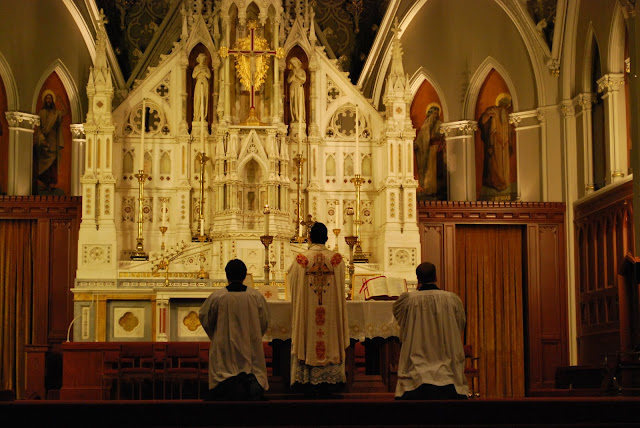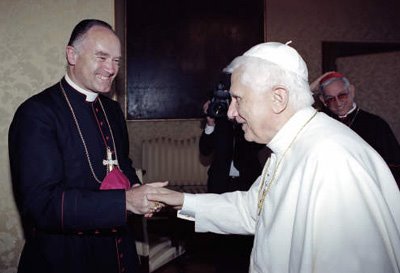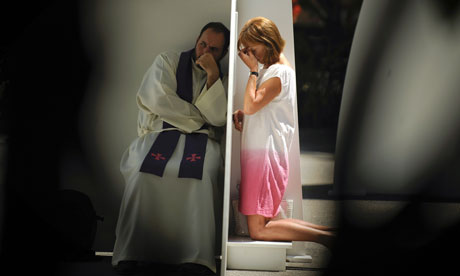Link to nobility.org.
Sunday, August 28, 2011
Quaeritur: How do Deduction and Induction Relate to A posteriori and A priori Reasoning
Quaeritur: How do Deduction and Induction Relate to A posteriori and A priori Reasoning
}
Saturday, August 27, 2011
Friday, August 26, 2011
Klaus Gamber on Liturgical Orientation
Klaus Gamber on Liturgical Orientation
Link to: RORATE CÆLI: ...propterea exaltabit caput.:'via Blog this'
Wednesday, August 24, 2011
Coming Soon: Bucketloads of New Doctors of the Church?
Coming Soon: Bucketloads of New Doctors of the Church?
- Saint John of Avila
- Saint Louis-Marie Grignion de Montfort
- Saint Bernardine of Siena
- Saint Thomas of Villanova
- Saint Ignatius of Loyola
- Saint John Bosco
- Saints Cyril and Methodius
- Saint Margaret Mary Alacoque
- Saint Bridget of Sweden
- Saint Vincent de Paul
- Saint Veronica Giuliani
- Saint Gregory of Narek
- Saint Lorenzo Giustiniani
- Saint Antonino of Florence
- Blessed Julian of Norwich
Link to the Chiesa article, which includes a list of seventeen candidates.
Monday, August 22, 2011
Meet the Popes: Pope Gregory IX (1227-1241)
Meet the Popes: Pope Gregory IX (1227-1241)
Link to nobility.org post: The pope who preached a Crusade against the German Emperor Frederick IIComments on Freddoso's Translation of the Summa's Treatise on Human Nature
Comments on Freddoso's Translation of the Summa's Treatise on Human Nature
Link to item on St. Augustine Press.
Berry: Ecumenical Councils are Not Entirely Infallible
Berry: Ecumenical Councils are Not Entirely Infallible
From Sylvester Berry's The Church of Christ (1927), pp. 458-9. Available from ITOPL.
Sunday, August 21, 2011
Aquinas and ‘the Arabs’ Conference, Universidad Panamericana, Mexico City, October 13-15
Aquinas and ‘the Arabs’ Conference, Universidad Panamericana, Mexico City, October 13-15
Call for Papers: Kalamazoo's International Congress on Medieval Studies (May 10-13, 2012)
Call for Papers: Kalamazoo's International Congress on Medieval Studies (May 10-13, 2012)
Link to: "Call for Papers: International Congress on Medieval Studies (May 10-13, 2012)" - News items - thomistica.net - Tommaso d'Aquino Newsletter and RSS Newsfeed
The Invalidity of SSPX Absolutions
The Invalidity of SSPX Absolutions
Link to Fr. Z's post: QUAERITUR: Going to SSPX priest for absolution of excommunication.Una Voce Ventura Conference at Thomas Aquinas College
Una Voce Ventura Conference at Thomas Aquinas College
Archbishop Chaput: Media Not Trustworthy on Religion
Archbishop Chaput: Media Not Trustworthy on Religion
Today's Novus Ordo Collect vs. its TLM Counterpart
Today's Novus Ordo Collect vs. its TLM Counterpart
Alcuin Reid Reviews Fr. Cekada's Work of Human Hands
Alcuin Reid Reviews Fr. Cekada's Work of Human Hands
Scotus on whether Relations Individuate
Scotus on whether Relations Individuate
Link to: The Smithy: "Scotus on whether Relations Individuate."Traditional Quotes Against Communion in the Hand
Traditional Quotes Against Communion in the Hand
General Knowledge: The New Liturgy Was Composed by Protestants
General Knowledge: The New Liturgy Was Composed by Protestants
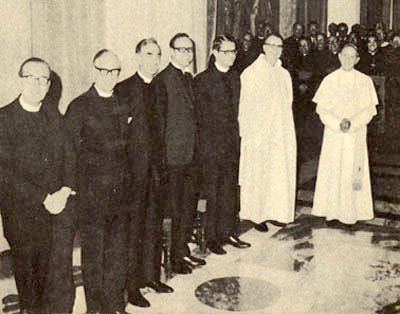 |
| Paul VI posing with six Protestant theologians who were part of the commission encharged with writing the New Mass. |
Links to: RORATE CÆLI: "New liturgy composed by Protestants."
Saturday, August 20, 2011
New Publisher Editiones Scholasticae Reprints German Scholastic Philosophy Works
New Publisher Editiones Scholasticae Reprints German Scholastic Philosophy Works
Link to Editiones Scholasticae.
Dare We Hope... St. John Chrysostom Replies to Von Balthasar (Tonight's 2nd Nocturn)
Dare We Hope... St. John Chrysostom Replies to Von Balthasar (Tonight's 2nd Nocturn)
St. John of Avila to be Proclaimed Doctor, Pope Benedict Announces
St. John of Avila to be Proclaimed Doctor, Pope Benedict Announces
Meet the Doctors: St. Bernard of Clairvaux
Meet the Doctors: St. Bernard of Clairvaux
From Matins of the Feast of St Bernard of Clairvaux, Confessor and DoctorOnline source: www.breviary.net
Absolutio: Ipsíus píetas et misericórdia nos ádjuvet, qui cum Patre et Spíritu Sancto vivit et regnat in sæcula sæculórum.R. Amen. | Absolution: May his loving-kindness and mercy assist us. Who, with the Father, and the Holy Ghost, liveth and reigneth, for ever and ever. R. Amen. |
V. Jube domne, (Dómine) benedícere. | V. Vouchsafe, Reverend Father (O Lord), thy blessing. |
Benedíctio 4: Deus Pater omnípotens sit nobis propítius et clemens. R. Amen. | Benediction 4: May God the Father Almighty shew us his mercy and pity. R. Amen. |
| Lesson iv | |
 St. Robert of Molesmes welcomes St. Bernard of Clairvaux into the Cistercian Order | |
Bernárdus, Fontánis in Burgúndia honésto loco natus, adoléscens propter egrégiam formam veheménter sollicitátus a muliéribus, numquam de senténtia coléndæ castitátis dimovéri pótuit. Quas diáboli tentatiónes ut effúgeret, duos et vigínti annos natus, monastérium Cisterciénse, unde hic ordo incépit et quod tum sanctitáte florébat, íngredi constítuit. Quo Bernárdi consílio cógnito, fratres summópere conáti sunt eum a propósito deterrére. In quo ipse eloquéntior ac felícior fuit ; nam sic eos aliósque multos in suam perdúxit senténtiam, ut cum eo trigínta júvenes eámdem religiónem suscéperint. Mónachus, jejúnio ita déditus erat, ut quóties suméndus esset cibus, tóties torméntum subíre viderétur. In vigíliis étiam et oratiónibus mirífice se exercébat ; et, christiánam paupertátem colens, quasi cæléstem vitam agébat in terris, ab omni caducárum rerum cura et cupiditate aliénam. | Bernard was born at a decent place in Burgundy called Fontaines. On account of extraodinary good looks, he was as a boy very much sought after by women, but he could never be turned aside from his resolution to keep chaste. To fly from these temptations of the devil, he determined at two-and-twenty years of age to enter the monastery of Citeaux, whence the Cistercian Order took its rise. When this resolution of Bernard's became known, his brothers did all their diligence to change his purpose, but he only became the more eloquent and happy about it. Them and others he so brought over to his mind, that thirty young men entered the same Order along with him. As a monk he was so given to fasting, that as often as he had to eat, so often he seemed to be in pain. He exercised himself wonderfully in watching and prayer, and was a great lover of Christian poverty. Thus he led on earth an heavenly life, purged of all care and desire for transitory things. |
V. Tu autem, Dómine, miserére nobis. R. Deo grátias. | V. But thou, O Lord, have mercy upon us. R. Thanks be to God. |
 The Abbey of Citeaux | |
R. Honéstum fecit illum Dóminus, et custodívit eum ab inimícis, et a seductóribus tutávit illum : * Et dedit illi claritátemætérnam.V. Justum dedúxit Dóminus per vias rectas, et osténdit illi regnum Dei. R. Et dedit illi claritátemætérnam. | R. The Lord multiplied the fruit of his labours and defended him from his enemies, and kept him safe from those that lay in wait. *And gave him perpetual glory. V. The Lord guided the righteous in right paths, and shewed him the kingdom of God. R. And gave him perpetual glory. |
 | |
V. Jube domne, (Dómine) benedícere. | V. Vouchsafe, Reverend Father (O Lord), thy blessing. |
Benedíctio 5: Christus perpétuæ det nobis gáudia vitæ.R. Amen. | Benediction 5: May Christ bestow upon us the joys of life eternal. R. Amen. |
| Lesson v | |
 The Abbey of Clairvaux, where St. Bernard was made Abbot in 1115 | |
Elucébat in eo humilitas, misericórdia, benígnitas. Contemplatióni autem sic addíctus erat, ut vix sénsibus, nisi ad offície pietátis, uterétur : in quibus tamen prudéntiæ laude excellébat. Quo in stúdio occupátus, Genuénsem ac Mediolanénsem aliósque episcopátus oblátos recusávit, proféssus se tanti offícii múnere indígnum esse. Abbas factus Claravallénsis, multis in locis ædificávit monastéria, in quibus præclára Bernárdi institútio ac disciplína diu víguit. Romæ sanctórum Vincéntii et Anastásii monastério, ab Innocéntio secúndo Papa restitúto, præfécit abbátem illum, qui póstea Eugénius tértius summus Póntifex fuit ; ad quem étiam librum misit de Consideratióne. | He was a burning and shining light of lowliness, mercifulness, and kindness. His concentration of thought was such, that he hardly used his senses except to do good works, in which latter he acted with admirable wisdom. Thus occupied, he refused the Bishopricks of Genoa, Milan, and others, which were offered to him, declaring that he was unworthy of so high a sphere of duty. Being made Abbot of Clairvaux he built monasteries in many places, wherein the excellent rules and disciplines of Bernard long flourished. When Pope Innocent II restored the monastery of St. Vincent and St. Anastasius at Rome, Bernard set over it the Abbot who was afterwards the Supreme Pontiff Eugene III, and who is also the same to whom he addressed his book upon Consideration. |
V. Tu autem, Dómine, miserére nobis. R. Deo grátias. | V. But thou, O Lord, have mercy upon us. R. Thanks be to God. |
 The Church of Ss. Vincent and Anastasius, by the Trevi Fountain, Rome | |
R. Amávit eum Dóminus, et ornávit eum : stolam glóriæ índuit eum, * Et ad portas paradísi coronávit eum.V. Induit eum Dóminus lorícam fídei, et ornávit eum. R. Et ad portas paradísi coronávit eum. | R. The Lord loved him and adorned him; he clothed him with a robe of glory : * And crowned him at the gates of Paradise.V. The Lord hath put on him the breast-plate of faith, and hath adorned him. R. And crowned him at the gates of Paradise. |
 | |
V. Jube domne, (Dómine) benedícere. | V. Vouchsafe, Reverend Father (O Lord), thy blessing. |
Benedíctio 6: Ignem sui amóris accéndat Deus in córdibus nostris. R. Amen. | Benediction 6: May God enkindle in our hearts the fire of his holy love. R. Amen. |
| Lesson vi | |
 Saint Bernard preaching the Second Crusade before Saint Bernard preaching the Second Crusade beforeKing Louis VII at Vézelay in Burgundy, March 31, 1146 | |
Multa prætérea scripsit, in quibus appáret eum doctrína pótius divínitus trádita quam labóre comparáta instrúctum fuísse. In summa virtútum laude exorátus a máximis princípibus de eórum componéndis controvérsiis et de ecclesiásticis rebus constituéndis, sæpius in Itáliam venit. Innocéntium item secúndum Pontíficem máximum in confutándo schísmate Petri Leónis, cum apud imperatórem et Henrícum Angliæ regem, tum in concílio Pisis coácto, egrégie adjúvit. Dénique, tres et sexagínta annos natus, obdormívit in Dómino, ac, miráculis illústris, ab Alexándro tértio Papa inter Sanctos relátus est. Pius vero octávus Póntifex máximus, ex sacrórum Rítuum Congregatiónis consílio, sanctum Bernárdum universális Ecclésiæ Doctórem declarávit et confirmávit, nec non Missam et Offícium de Doctóribus ab ómnibus recitári jussit, atque indulgéntias plenárias quotánnis in perpétuum órdinis Cisterciénsium ecclésias visitántibus die hujus Sancti festo concéssit. | He was the author of many writings, in which it is manifest that his teaching was rather given him of God, than gained by hard work. In consequence of his high reputation for excellence, he was called by the most exalted Princes to act as arbiter of their disputes, and for this end, and to settle affairs of the Church, he often went to Italy. He was an eminent helper to Pope Innocent II, in putting down the schism of Peter Leoni, and worked to this end, both at the Courts of the Emperor and of Henry, King of England, and in the Council of Pisa. He fell asleep in the Lord in the sixty-third year of his age. He was famous for miracles, and Pope Alexander III numbered him among the Saints. Pope Pius VIII, acting on the advice of the Congregation of Sacred Rites, declared and confirmed St. Bernard a Doctor of the Universal Church. He also commanded that all should use the Mass and Office for him as for a Doctor, and granted perpetual yearly plenary indulgences to all who should visit Churches of the Cistercian Order upon the Feastday of this Saint. |
V. Tu autem, Dómine, miserére nobis. R. Deo grátias. | V. But thou, O Lord, have mercy upon us. R. Thanks be to God. |
 | |
R. Iste homo perfécit ómnia quæ locútus est ei Deus, et dixit ad eum : Ingrédere in réquiem meam : * Quia te vidi justum coram me ex ómnibus géntibus. V. Iste est, qui contémpsit vitam mundi, et pervénit ad cæléstia regna. R. Quia te vidi justum coram me ex ómnibus géntibus. V. Glória Patri, et Fílio, et Spirítui Sancto. R. Quia te vidi justum coram me ex ómnibus géntibus. | R. This is he which did according to all that God commanded him ; and God said unto him : Enter thou into my rest : * For thee have I seen righteous before me among all people.V. This is he which despised his life in this world, and is come unto an everlasting kingdom. R. For thee have I seen righteous before me among all people.V. Glory be to the Father, and to the Son, and to the Holy Ghost. R. For thee have I seen righteous before me among all people. |
De Mattei on the Liberals' Hijacking of the Second Vatican Council
De Mattei on the Liberals' Hijacking of the Second Vatican Council
Link to: RORATE CÆLI: Religious "fervor" and the outcome of the First Session of the Second Vatican CouncilPriest-confessors at WYD have authority to lift excommunication for abortion
Priest-confessors at WYD have authority to lift excommunication for abortion
Link to: Catholic Culture: Priest-confessors at World Youth Day given authority to lift excommunication for abortionFriday, August 19, 2011
Awe-inspiring Quotes from St. John Eudes
Awe-inspiring Quotes from St. John Eudes
Sacred Heart Devotion Deleted from the Collect of the Feast of St. John Eudes
Sacred Heart Devotion Deleted from the Collect of the Feast of St. John Eudes
Link to Fr. Z's post: An exploration of two Collects, Extraordinary Form and Ordinary.Pope Benedict To Young Professors
Pope Benedict To Young Professors
Why Are Seminaries Afraid of the Extraordinary Form?
Why Are Seminaries Afraid of the Extraordinary Form?
Link to: The Chant Café: Why Are Seminaries Afraid of the Extraordinary Form?Tanquerey on the Utility of Using a Rule of Life
Tanquerey on the Utility of Using a Rule of Life
Wednesday, August 17, 2011
Statistics on the Reception of Summorum pontificum
Statistics on the Reception of Summorum pontificum
Link to New Oxford Review article: "Out of the Liturgical Ghetto."
Bonnetty's Traditionalism and the Supposed Rationalism of St. Thomas
Bonnetty's Traditionalism and the Supposed Rationalism of St. Thomas
Tuesday, August 16, 2011
God’s plan for men pressuposes inequality
God’s plan for men pressuposes inequality
Link to nobility.org article: "God’s plan for men pressuposes inequality."
Why London is Burning: The Rejection of Traditional Family Values
Why London is Burning: The Rejection of Traditional Family Values
Link to: Why London is burning | LifeSiteNews.com
The Catholic Publishing Industry: An Endangered Species
The Catholic Publishing Industry: An Endangered Species
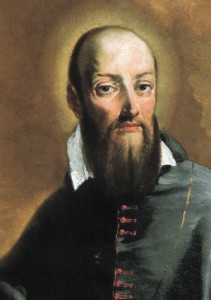 |
| St. Francis de Sales, Patron of the Catholic Press, pray for us! |
Link to article on New Oxford Review: Is Your Job on the Endangered-Species List?.
Card. Cañizares on the SSPX: Not Much Nuance
Card. Cañizares on the SSPX: Not Much Nuance
Link to Fr. Z's blog post.
Link to Angelqueen forum discussion.



.jpg)







